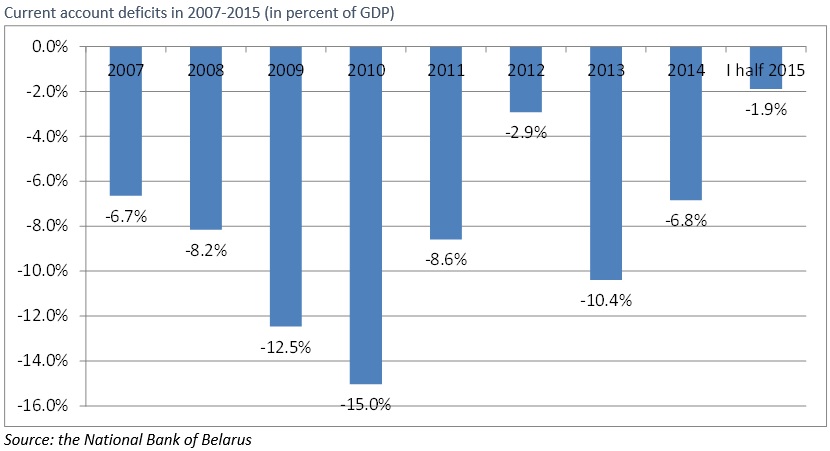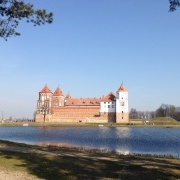Belarus Finally Reforms Its Economy?

On 26 September in New York, Alexander Lukashenka met with IMF chief Christine Lagarde. They discussed prospects for an IMF-supported programme.
According to the IMF statement “Lagarde welcomed some recent progress in strengthening the policy framework in Belarus, but emphasised that a more comprehensive reorientation of policies, consistently supported at the highest level, is needed to restore stability and sustainable growth”.
In fact, in the current presidential campaign Lukashenka is distancing himself from populism. Moreover, since the beginning of 2015 the Minsk's authorities have consciously conducted a conservative economic policy and slowly introduced structural reforms, despite the recession.
On 27 December 2014 Lukashenka appointed a new government and central bank chief. These new appointments consisted of several moderate reformers with rather liberal views. In contrast to Russia, the Belarusian president took advantage of the current difficult economic situation to change government and economic policy.
Russia’s recession and low energy prices, limit Belarusian exports, as well as energy subsidies from imports of cheap Russian natural resources. Without them the quasi-socialist Belarusian economy does not generate growth. Adverse external conditions will hardly improve in the coming years, and that is why Minsk has no alternatives but to carry out structural reforms.
Conservative monetary policy
The new Belarusian policymakers have been successfully fighting inflation. The National Bank of Belarus (NBB) immediately tightened monetary policy and introduced monetary targeting to curb inflation. The real interest rate, which explains how much the nominal interest rate exceeds annual inflation, is already over 13%. For comparison, in Poland it is currently at around 2 percent. This completely suffices to eliminate any price growth.
The inflation’s slowdown is clear on a monthly basis. In July and August, prices increased by 0.2% per month. Extrapolating such a pace of inflation for the whole year, the annual inflation rate will amount to only 2.5%.

In addition, the NBB successfully liberalised the exchange rate regime. As a result, transparent market conditions have formed the current currency rate, while the regulator has virtually withdrawn from intervening in the market. Finally, the exchange rate has served as an automatic stabiliser for internal and external shocks.
The strong depreciation of the national currency has balanced the country's current account. Since the beginning of 2015 the dollar exchange rate in Belarusian roubles has increased by 50%. As a result, in the second quarter of 2015 the NBB recorded a current account surplus of 4.3% of quarterly GDP, which is highest since the first quarter of 2005. By contrast in the fourth quarter of 2014 the deficit was 9.5% of GDP. The new currency policy automatically avoids high current account deficits which led in 2011 to the worst currency crisis in Belarus in the past 20 years.

Conservative fiscal policy
The current presidential campaign is the first during which the authorities have pursued a conservative fiscal policy. In January-August 2015 the public sector surplus debt amounted to $1 bn (2.7% of GDP) which facilitated servicing the public debt.
The government maintains a simple principle: wage growth should not exceed labour productivity growth. In January-August 2015 real salaries fell by over 3% or 0.5 p.p. more than productivity. Thus, unit labour costs declined and became an anti-inflationary factor.
Since 2012 Minsk has managed to control its growing foreign debt. In relation to GDP external debt fell from 58% at the end of 2011 to 55% on 1 July 2015. Last year debt decreased also in absolute terms, by around $3 bn. This is a fundamental change compared to 2007-2010 when the government stimulated economic growth by foreign loans.
Structural Reforms Implemented
Besides stabilising the economy, simultaneously the government conducts structural reforms, including restructuring state-owned industrial enterprises. Despite the elections, employment in the largest industrial factories decreased by around 10 percent.
For example, Minsk Automobile Plant “MAZ” and Minsk Tractor Works “MTZ”, the two biggest employers, employed over 2 thousand (10%) and 2.7 thousand (14%) people less in the first quarter of 2015 than a year before. Even the potash factory “Belaruskali”, the third largest employer and the most profitable company, fired 1.5 thousand (8%) of its employees. In fact, the authorities recommend or at least allow management boards to downsize industrial enterprises quicker than the whole economy.
Some state-owned companies plan to accelerate the privatisation of redundant assets. Currently, the State Property Committee offers more than one thousand properties for sale. Auctions for some of them are assigned for the coming weeks. However, despite the private sector’s demand for free commercial space, asset privatisation has not been carried out on a broad scale and is currently very slow.
The authorities occasionally decide to liquidate unprofitable industrial enterprises. For example, in August 2015 a court ordered the liquidation of a hosiery factory called “KIM”. Only two years ago the company, founded in 1931, employed more than 900 people.
Besides restructuring enterprises, the government has limited direct lending to the produce sector and planned to depart from future planning initatives. According to the independent news agency BelaPAN, the resolution’s draft, approving the prognostic parameters for 2016 departs from the compulsory nature of the forecasts and grants them only an indicative character. In other words, the state will not interfere with a firms’ production and financial processes in order to “accomplish” forecasts.
Moreover, Minsk has announced ambitious plans for further reforms. Earlier this year Belarus developed with the World Bank “a road map of structural reforms”. In accordance with this, Minsk has already adopted a plan of radical increases in tariffs for household servicing.
International recognition
The new economic policy in Belarus has been gaining recognition from international organisations. The last IMF mission to Minsk in the first half of July praised the conducted economic policy and plans for structural reforms. The IMF assured the regime that if such a policy is continued, negotiations on granting a new IMF loan may be successfully finished by year-end.
To conclude, since the beginning of 2015 the new Belarusian economic policymakers have been conducting a conservative economic policy. As a result, the economy regains balance, after being hit by external shocks in the second half of 2014 and the first half of 2015. In these circumstances, Minsk has taken unpopular reforms, such as firms’ downsizing, the sale of idle assets, and the liquidation of some enterprises.
These reforms, in fact, are rudimentary and slow. Hence, they cannot bring immediate success. One hopes the reform will continue after the presidential campaign. Finally, Lukashenka reforms the economy not because he wants it, but rather because he has no choice. If external factors do not improve, perhaps at last the authorities will implement the changes that should have been implemented in the 1990s.





